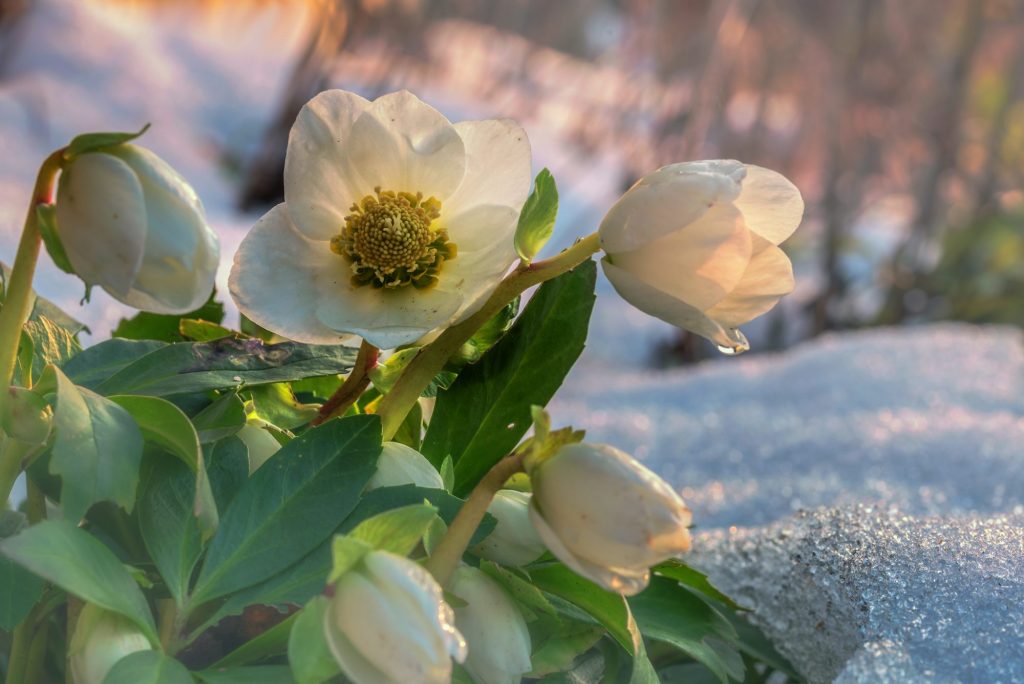Start the year as you mean to go on and this is especially important if you’re growing vegetables. It’s time to get out the seed catalogues and decide what varieties you want to grow – it’s always worth looking at what new varieties are available.
Early seeds
For an early crop of rhubarb cover a clump over with an old dustbin or large container to force it into early growth.
Seed potatoes usually arrive at the start of the New Year, weather permitting. We stock over 45 different varieties, including several of the Albert Bartlett range and old favourites like Rocket, King Edward and Arran Pilot. Once you get them home, put them to chit (allow shoots to form), egg trays are ideal for this, place them in a light, cool and frost-free environment.
Onion sets and shallots are usually delivered in February. Remember you can start seed potatoes growing in pots inside as early as you like, so long as they are protected from any frosts we may have.
A fresh start
If you haven’t used winter wash on your fruit trees yet, do so on a mild day before the buds start to burst, this will clear up any pests and their eggs left overwintering on your trees. Make sure you have a grease band wrapped round the stems or coat the main stem with fruit tree grease, this can be kept on all year round to catch any pests climbing up the tree.
This is an important step to carry out every year, but more so now as there are no fungicides available on the market to treat diseases of fruit trees such as scab, rust and mildews. If the weathers fine and frost free, get out into the garden to finish any clearing up jobs that weren’t done at the end of 2019, especially tidying up leaves and debris. This will help to prevent disease from spreading and removes hiding places for slugs and snails.
Trim old leaves away from hellebores, this makes it easier to see the flowers and prevents the spread of disease. If there’s no frost in the ground, you can mulch plants ready for spring growth in a few weeks time. If the snow and hard frosts do arrive early as they have in previous years make sure vulnerable plants – hebe, phormium, cordyline, palms and tree ferns are covered with fleece and its worth brushing snow off conifers and hedges to stop them splitting open from the weight of snow.
Clean and clear
Whilst you have very little in your greenhouse, January and February are the ideal times to turn it out, wash it down and disinfect it. Remove as much as possible from the greenhouse; wash down any staging, seed trays, pots etc with a good detergent or greenhouse disinfectant. Wash down the glass again with a detergent or disinfectant to remove any algae, pests and overwintering eggs. Only wash glass down on a mild day to prevent the risk of cracking cold panes of glass. Having a clean greenhouse at the beginning of the season ensures that seeds and plants get off to a good start.
If you want to start something off early in the greenhouse try sowing some sweet pea seeds in a cool environment. Use a seed compost and sow them into peat pots two to three seeds per pot. When they’re ready for planting out the roots will have grown through the pot and its then very easy to just pop the plant into the ground or a container. If you’ve got some heat Begonias can be sown early but they do need to be kept warm and not planted outside before mid to late May.
Spring colour
Looking ahead to later in the year check out the ranges of geraniums, fuchsias and hanging basket plants that will be available in April and May. Plug plants will be available around the beginning of March, but they will need heat to start with. Grow them in the house to get a head start, but remember you need to take note of the weather conditions and not be in a rush to put tender plants out before May time.
Look out for signs of colour in your garden. Plants such as hamamelis (witch hazel), snowdrops, viburnum tinus and hellebores will all be showing signs of colour that suggest spring is on its way.
Don’t forget our feathered friends, especially if the weather is poor – we’ve always got peanuts, seed, mealworms, fat balls and feeders in stock. Clean off bird tables regularly and remember to put out fresh water daily.






